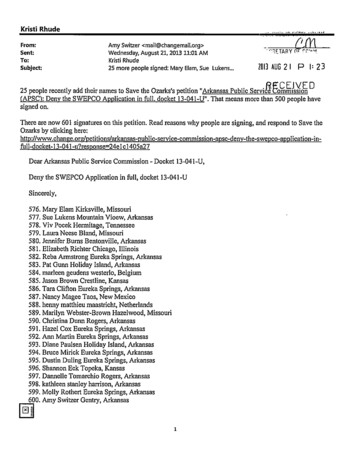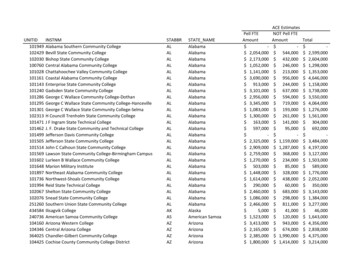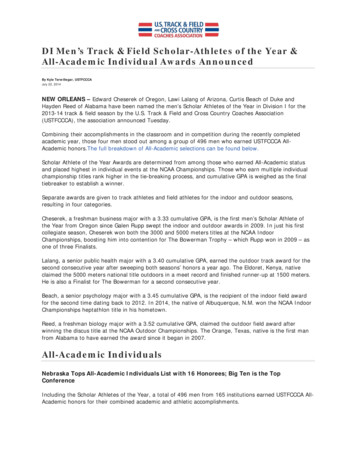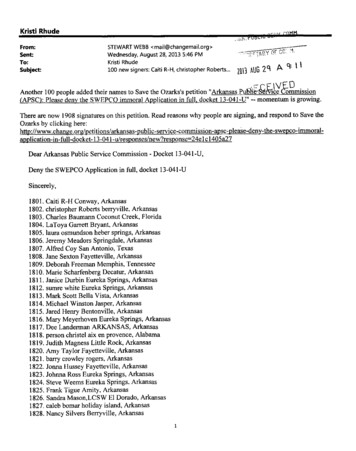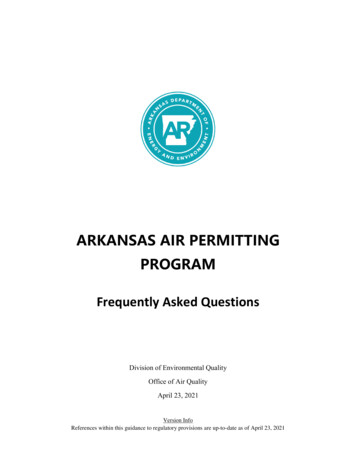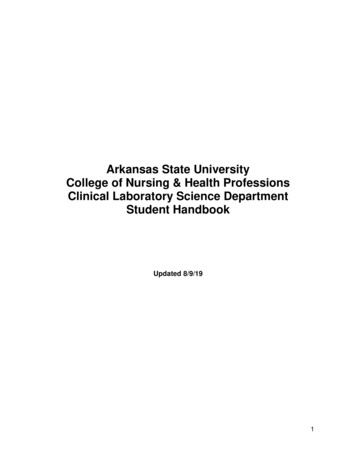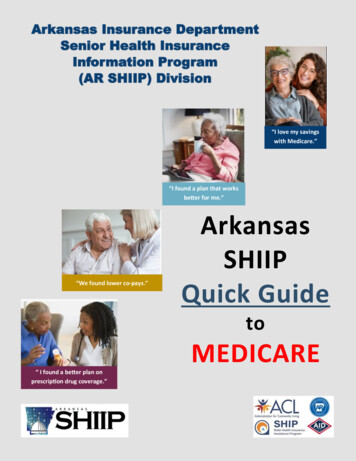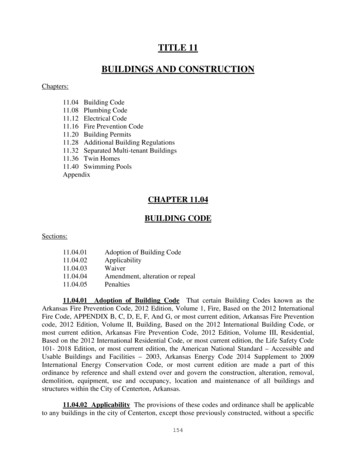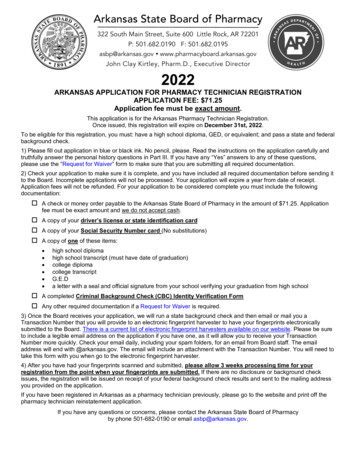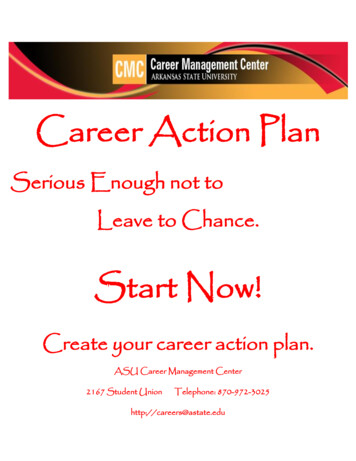
Transcription
Career Action PlanSerious Enough not toLeave to Chance.Start Now!Create your career action plan.ASU Career Management Center2167 Student UnionTelephone: 870-972-3025http://careers@astate.edu
Career Action PlanArkansas State UniversityFor Career Information and Resources Visit:http://careers.astate.edu/ Arkansas State University – JonesboroCareer Services ManagementP. O. Box 2490101 North Caraway Road, Room 2167State University, AR 72467-2490Phone: (870) 972-3025Fax: (870) 972-2783ASU System Campuses Beebe501-882-6452 Heber Springs870-250-9900 Marked Tree870-358-2117 Mountain Home870-508-6100 Newport870-512-7807 Paragould870-236-6354 Technical Center – Jonesboro870-932-2176Page 2
Career Action PlanAs a new college student, you will discover new friends, new experiences, and new knowledge.You will learn to appreciate the talents and abilities you have to offer and will develop andenhance your skills and interests.Beginning College Action Steps View college as preparation for your life and your career goals. Use your General Education courses to open doors to new fields of study and to developqualitative, writing and critical thinking skills. Begin to build a support network with other students, faculty, staff, alumni, andcommunity members. Join and participate in student organizations, clubs, and activities that interest you. Get acquainted with the Career Management Center (CMC) and visit the office locatedin the Suite 2167, Student Union on the second floor. Use our website to gather information about programs/majors and occupations:http://careers.astate.edu/ Complete a personal inventory of your values, skills, interests, and accomplishments. Attend the career information panels, workshops, and career fairs throughout the year. Find a summer job that will provide you an opportunity to learn more about the world ofwork. Explore the possibilities of experiential learning, internships, study abroad, studentexchange program, service learning, and faculty/student research.Page 3
This Plan Contains the Following Tools Which Will be Helpful inPlanning Your CareerCareer Exploration InventoryThe best way to start is to see where you are in the process. Begin by completing the “CareerExploration Inventory in this booklet. Career Exploration Inventory Scoring and Interpreting Your Career Exploration InventoryWe strongly suggest you take more than one career inventory. Schedule an appointment at theASU Counseling Center to take additional career assessments. Telephone: (870) 972-2318.Inventories OnlineCareer Internet databases and other online interactive computer programs are designed to helpyou explore options and make good decisions; and, it is a fun way to begin your career journey:http://careers.astate.edu/. Visit SIGI 3, “What to do With This Major?”, and the CMC Online ResourceCenter.Gathering Career InformationThe key to making any good decision is gathering accurate and up-to-date information such as:http://careers.astate.edu/. Review the information on the CMC website and hyperlinks as you work on the CareerAction Plan and Online Worksheet. Career Research WorksheetSetting SMART GoalsGoal setting is the process by which we create a picture of your “future” - a picture that allowsyou to be intentional about your activities and accomplishments. “Setting Smart Goals” Handout Goal Setting WorksheetReflectionAn important part of any process is reflection or looking back. How did I do? What would I dodifferently? What did I learn? Beginning Year Personal Inventory Career Exploration InventoryPage 4
Career Exploration InventoryThe following are statements that can pertain to stages in one’s career development. Determinewhether each statement is mostly true or mostly false in your present situation and markaccordingly. There is no “right” or “wrong” answers.Give yourself a point for each “false” answer.1. I do not know how to make a career decision.T F2. I have not decided on a program or I am uncertain about an area of interest.T F3. I am considering too many career options.T F4. Not any career options appeal to me at this time.T F5. I am not sure of my strengths and weaknesses.T F6. I do not know what I want to get out of work. (What would give me satisfaction?)T F7. I do not know which skills I want to use in my work.T F8. I do not know what kind of work suits my personality.T F9. I am uncertain about occupations in which I could perform well.T F10. I do not know how much money I will need to maintain the lifestyle that I wouldlike.T F11. There are too many career options that I do not know about.T F12. I do not know where to go to find information about careers.T F13. I do not know what kinds of questions to ask when I research careers.T F14. I do not know enough about what workers do in various occupations.T F15. I do not know what careers would be compatible with the major(s) that I havechosen or am considering.T F16. I do not know what education or training is required for a career that I have chosenor am considering.T F17. I do not know the employment prospects of a career that I am considering.T F18. I do not know the salary of a career that I am considering.T F19. I am uncertain about my ability to finish the education or training necessary for thecareer that I am considering.T F20. An influential person in my life does not approve of my career choice.T F21. I am afraid there are not enough jobs in the field that I am considering.T F22. I feel under pressure to make a career decision soon.T F23. The careers that I am considering may not pay enough to live the kind of life that Iwant.T F24. I cannot afford the schooling necessary for the career that I am considering.T F25. I am under pressure to pursue a career that I don't want.T FList one to three careers that you are considering at this time.1.2.3.Write Your Score Here:Page 5
Scoring and Interpreting Your Career Exploration InventoryScoring:Give yourself a point for each “false” answer. Write the number of points that you have in theblank below:What Your Score Means:My Score:If you received a score of 20 - 25, you are really on top of things and have obviously done a greatdeal of work on your career goals. These activities will be a good chance for you to affirm thosegoals. You might, however, want to spend some time analyzing those answers that you did mark“true.” Also, understand that many individuals begin with clear career goals only to have themchange. This is normal and okay.If you received a score of 10 - 19, your career management process is probably typical of astudent who is beginning, and these activities will be very helpful with setting some career coals.If the majority of your “true” answers were in questions 1 - 10, you might want to work atgathering “self information” by considering and/or doing the following: Talk with a Career Consultant at the Career Management Center. Call (870) 972-3025and schedule an appointment. Visit the CMC website: http://careers.astate.edu/. Go through self-directed, web based designed programs to help you explore careeroptions and make informed decisions. Visit the CMC http://careers.astate.edu/ to takecareer assessments and gain access to SIGI. To gain feedback and career assessmentresults visit the ASU Counseling Center website If the majority of your “true” answers were in questions 11-18, additional opportunities to gathermore career options and information are available as follows: If you are a first year student, you will want to visit various hyperlinks onlinehttp://careers.astate.edu/ categorized under Career Exploration and “What to do WithThis Major?” http://careers.astate.edu/. Check the Online Resource Center for hyperlinks to various sites to gather academic,occupational and career information.You might want to schedule an appointment with an Academic Advisor (870) e%20Page/index.php/ to explore majors orCareer/Community Connect Consultant to discuss careers in field of your choice. Participate in informational interviewing and job shadowing programs through the CMCCommunity Connect. The CMC will sponsor various workshops and events throughout the year to provideinformation on careers, programs, transferring and continuing your education.“True” answers in questions 19 - 25 indicate that you may be dealing with some of the emotionalissues involved in career decision-making. You may want to make an appointment with a CareerConsultant in Career Management (Suite 2167, Student Union, and 2nd Floor) or call a CareerCounselor in the ASU Counseling Center at (870) 972-3025 to discuss these issues.Page 6
If you received a score of less than 10, never fear; you just need to spend a little more time on allof the phases of career decision-making. These activities can definitely be helpful. Also it mightbe helpful to take a trip to the Career Management Center and schedule an appointment to talkwith a career consultant.Online WorksheetOnline assessments are self-directed programs designed to help you explore career options andmake informed decisions.You can access online assessment, values and interest inventories from CareerManagement Center http://careers.astate.edu/ and by scheduling an appointment at theASU Counseling Center http://www2.astate.edu/student-affairs/counseling/ or(870)972-2318Go to SIGI - Career Exploration and “What to do With This Major?http://careers.astate.edu/Self-Assessment: The Self-Assessment sections enables you to evaluate your work-relatedvalues, determine what interest fields you might like to pursue and explores work relatedactivities (what you like doing and what you do well).1. Complete the inventory on SIGI and explore “What to do With This Major?” or schedulean appointment with the ASU Counseling Center to take a career assessment inventory.Identify two areas of interest. Which career fields or majors did you find that are ofinterest to you? Please write them down.2. Complete the online values inventory. List the value that ended up as “essential” and“very important.” Please write them down.Page 7
Search: Search a variety of web sites to create a personalized list of occupations based on thefeatures that you identified through your online inventories and “What to do With This Major?”links.1. Do a search by college majors, choosing a program or major that you are considering.List three occupations that resulted from this search that you might be interested inpursuing.2. As you explored the sites, have you discovered new occupations that appeal to you? Listthese new occupations that appeal to you.Information Gathering: The information that you collect will provide you detailed informationabout occupations that interest you.1. Select an occupation from one of the resources that resulted from your search or anoccupation in which you are interested. List these occupations.2. List three things that you have learned about this occupation that you did not know.Skills: The Skills Section enables you to learn which skills are needed in an occupation andevaluate yourself on those skills.1. Using the same occupation that you chose for the last exercise, list the skills necessary forthat specific occupation.2. Put an * next to the skills that you have.Page 8
Preparing:1. Using the same occupation(s) that you used for the previous questions, indicate theeducation that is needed.2. What subjects do you have to study and master for this occupation?Summary:1. After all that you have learned about this occupation(s), describe why you still interestedin it? Explain your answer. Please be specific.2. After all, that you have learned about this occupation(s), describe why you are capable ofpursuing it?3. What skills or preparation may challenge you? How and why?4. If you think that the occupation you chose for this assignment is no longer feasible, whichother options might you explore?Page 9
Career Management Center Research WorksheetWhen making a career decision, learn as much as you can about your choices or options. You donot want to make a decision with inaccurate or insufficient information. You do not want to: Discover that the career you have chosen does not support the type of living style foryour future. Discover that the career you have chosen requires 60 - 80 hours a week, when you haveother specific responsibilities and obligations to which you have committed to. Discover that in order to find a job in your field you will have to move to a larger city onthe coast – when you want to live in Arkansas or stay in Craighead County orsurrounding area. To avoid issues, learn as much as you can before committing yourself to a career choice.Completing the CMC Research Worksheet provides you an opportunity to gather informationabout a career option. You may not have made a career choice yet and that’s okay. To do theworksheets simply choose a career that you want to learn more about. Depending upon what youlearn, the occupation you have chosen may or may not work for you.The following resources can help you complete the worksheet: ASU’s Career Management Center’s website is filled with academic occupational andeducational information. Career Consultants are always available to provide a tour orhelp you find information. The Internet is a wonderful source of career information. You will find great career linkson Career Management Center’s website at http://careers.astate.edu/.Page 10
Career Research WorksheetCareer Ideal: Date:Work Description: What are the primary work tasks? What is a typical day like?Work Hours: What are the typical work hours? Can you bring work home?Training: What education is required? What major(s) are appropriate?Skills: Which skills are required to do the job well?Personality Traits: Which personality traits are useful?Work Setting: What types of work settings includes this career choice?Salary: What salary range can you expect?Advancement: Describe possible paths of advancement within this career choice.Employment Outlook: What is the current and future forecast for this occupation(s)?Page 11
Geographic Mobility: Is this career choice limited to certain areas of the country or particularkinds of environments such as a city or the ocean?Which professional organizations are related to this career?What are some of the pros and cons of this career?What do you like about this career?What do you dislike about this career?Now that you know about this career, will you keep it as one of your options?Which resources did you use to complete this work sheet?1.2.3.Page 12
Setting SMART GoalsOnce you have researched different careers that might be appropriate, you need to thinkpurposefully about the next steps to take. In short, you will need to set some goals.Goal setting is the process by which we create a picture of our “projected future” – a picture thatallows us to be intentional about today’s activities and accomplishments. Done effectively, goalsetting allows us to identify those specific activities and strategies that move us toward thatfuture. In developing career-related goals, pay particular attention to identifying short-term goalswhich will help you accomplish your long-term goals. In addition, choose goals that will helpyou develop the qualities you will need in your career.Goals should be specific. Use the activities from previous modules to make your goals as clearand focused as possible. Example of a statement that needs work: I want to work with people. Example of an improved goal statement: I want to plan social and educational programsfor children and adolescents.Goals should be measureable. You will be unable to determine whether or not you areachieving your goal if you have no means for measuring outcomes. Statement needs work: I want to do well in my classes. Improved statement: I want to earn a 3.00 GPA this year with no grade below a “B”.Goals should be attainable. Setting unattainable goals will set you up for failure. Strike abalance by drafting realistic goals that challenge you. Example of a statement that needs work: I want to obtain a degree in business within oneyear of graduation. Example of an improved statement: I want to earn my Bachelor’s Degree in Businesswithin four years of graduating from high school.Page 13
Goals should be relevant. Is this goal consistent with the other goals you have established?Does it really fit with your immediate and long-range plans? Example of a statement that needs work: I wish to thoroughly review each career listed inthe Occupation Outlook Handbook. Example of an improved statement: I will spend time two hours a day, twice a week onthe Career Management Center Website researching careers associated with my degreeprogram.Goals should be traceable. How will you know whether or not you are actually moving towardsyour goal? Establishing traceable goals will allow you to monitor your progress. Example of a statement that needs work: I want to improve my public speaking. Example of an improved statement: I will join the ASU Young Professional Network toimprove my public speaking and develop a professional networking system.What if you have established SMART goals, progressed toward meeting those goals, andsuddenly finds that you are not where you wish to be after all? Realize that we are all changingconstantly and that goals established earlier may evolve and change as we do. Take time toreassess your goals periodically. If you find that your new (or long-range) needs are not met bythese goals, be creative and establish a new plan by setting new goals.Adapted from: Choices and Challenges: Foundation for Career Planning, Indiana University.Page 14
Goal Setting WorksheetThis worksheet is designed to help establish goals toward your future and plan activities andstrategies for meeting these goals. As you do this exercise, you should realize that your goals arenot “set in stone.” They may change and that is okay. The important element to remember is tobegin planning and to dream all you want.Before conducting this exercise, be sure to read the handouts: Setting SMART Goals”.Long-Range GoalsFor the purpose of this exercise, long-range goals are those that you set for the time that you willgraduate and receive your Bachelor’s Degree.Career Goal: Where do you hope to be in your career management process at the time of yourgraduation?Examples: I will begin my career in advertising with an entry-level copyright position in a largeadvertising firm. I will begin my Bachelor’s program in Interdisciplinary Studies to become a professionalwho works in the field of social service. I will begin working as a nurse in an urban hospital.Educational Goals: Which educational goals do you hope to accomplish with your Bachelor orMinor degree program(s)?Examples: I plan to graduate with a Bachelor of Art degree. My major will be JournalismAdvertising, and my minor will be Spanish. I plan to graduate with a Bachelor of Science Degree with a Minor in Administration. I plan to graduate with an Associate Degree in Nursing with a Behavioral Scienceemphasis.Personal Goals: While at college, what would you like to accomplish to make you a better wellrounded person?Examples: I would like to learn another language and study abroad. I would like to take an art course and perhaps strengthen my theater skills. I would like to participate in student government and run for the Student Senate.Page 15
Goal Setting WorksheetShort-Range GoalsShort-range goals are those specific activities and strategies that move us toward our long-rangegoals or our future. The following sections/questions, there is a website that will give youinformation to help you set these short range goals.For each of the following sections/questions, there is a website that will give you information tohelp you set these short range goals.Skills: What skills do you need to develop in order to realize your goals?Career Management Center: Which services and programs does the CMC offer to help youdevelop and implement your goals?Courses: Which specific General Education or elective courses might help with your career orpersonal goals?Research: Are there opportunities in your program to work with faculty on a research project orindependent study? If so, what would you like to explore?Study Abroad/NSE: Would you like to study abroad or attend another college or university onthe National Student Exchange before you graduate? If so, where would you like to go?Service Learning: What Service Learning project would you like to get involved in? Will ithelp you with your goals? How?Page 16
Student Organizations: Which student organizations would you like to join? How mightjoining these organizations help you attain your career or personal goals?Student Activities: Are there any student activities such as art, forensics or theater group whichyou would like to be involved? If so, which ones? What would you like to accomplish?Leadership Opportunities: What opportunities are there for leadership in the activities andorganizations that you have chosen: How might those help with your goals?Professional Organizations: Every career has a professional organization associated with it.What professional association is associated with your career choice? Can students join? Is therea Student Chapter on campus?Internships: An internship or practical experience built in to your academic program? If not,what kind of internship or practical experience would you like to pursue while in college?Student Employment: Certain employment that you have while as a student can help youachieve your goals. For examples, working at a youth camp is excellent for a teacher; assistingat the IT HELP desk builds skills for the future systems manager; and working in the studentsservices is an excellent public relations experience. What job might facilitate your career goals?Remember, your goals and plans may change and it’s okay! With this in mind you might wantto make a blank copy of this worksheet for future use. If you had trouble developing goals forthis exercise, you might want to schedule an appointment with a Career Consultant at (870)9723025 or an Academic Counselor at the Wilson Academic Advising Center, (870) 972-2318.Page 17
Personal InventoryTo help you reflect and record the activities and organizations in which you are involved whileenrolled at the University, the Career Management Center has created the "StudentDevelopment Inventory." As you become involved, record your activities and reflect on thelessons, talents, and skills that you have learned from that involvement.Academic/Co-CurricularWorkshops, Seminars &Special Training(Ex: Leadership Workshops,Career Seminars, ComputerTraining.)Nature of Your Involvement(Ex: Planner, Presenter,Participant.)Challenges, Lessons, or SkillsLearnedCultural Arts Programs &Services(Ex: Artist Committee,Forum Committee,International Folk Fair.)Nature of Your Involvement(Ex: Officer, CommitteeMember, Program Planner.)Challenges, Lessons, or SkillsLearnedWritten & Oral Presentations(Ex: Reports, Proposals,Readings.)Nature of Your InvolvementChallenges, Lessons, or SkillsLearnedPage 18
Artistic Performance(Ex: Art, Music, Theatre,Dance.)Nature of Your InvolvementChallenges, Lessons, or SkillsLearnedVolunteer Experience(Ex: Girl Scouts, Women'sShelter, Church Activities,School.)Nature of Your InvolvementChallenges, Lessons, or SkillsLearnedInternational Education(Ex: Study Abroad Program,Travel.)Nature of Your InvolvementChallenges, Lessons, or SkillsLearnedResearch (Ex:Faculty/StudentCollaborative Research.)Nature of Your InvolvementChallenges, Lessons, or SkillsLearnedPage 19
Personal/Interpersonal LeadershipClub & Organizations(Ex: Campus and Civic)Nature of Your Involvement(Ex: Officer, CommitteeChair.)Challenges, Lessons, or SkillsLearnedStudent Publications (Ex:Newsletter/Brochures.)Nature of Your Involvement(Ex: Editor, Reporter,Photographer.)Challenges, Lessons, or SkillsLearnedStudent Government orOther Civic InvolvementNature of Your Involvement(Ex: Officer, Chairperson,Member.)Challenges, Lessons, or SkillsLearnedCareer Workshops, Seminars& Special TrainingNature of Your InvolvementChallenges, Lessons, or SkillsLearnedSummer & Part-timeEmploymentNature of Your InvolvementChallenges, Lessons, or SkillsLearnedCareer ManagementPage 20
Internship/ExperientialEducationNature of Your Involvement(Jobs Duties andAccomplishments)Challenges, Lessons, or SkillsLearnedHonors & Awards(Ex: Campus and Civic )Nature of Your InvolvementChallenges, Lessons, or SkillsLearnedHonors Organization(Ex: Phi Theta Kappa,Alpha Lambda Delta )Nature of Your InvolvementChallenges, Lessons, or SkillsLearnedHonors/AwardsHealth, Fitness & RecreationRecreation(Ex: Leisure Activities,Hobbies )Nature of Your Involvement(Ex: Team Member, Captain,Letter Awardees )Challenges, Lessons, or SkillsLearnedPerson Fitness Programs (Ex:Physical and Emotional )Nature of Your InvolvementChallenges, Lessons, or SkillsLearnedPage 21
Notes Page 22
Career Exploration Inventory The best way to start is to see where you are in the process. Begin by completing the "Career Exploration Inventory in this booklet. Career Exploration Inventory Scoring and Interpreting Your Career Exploration Inventory We strongly suggest you take more than one career inventory.
